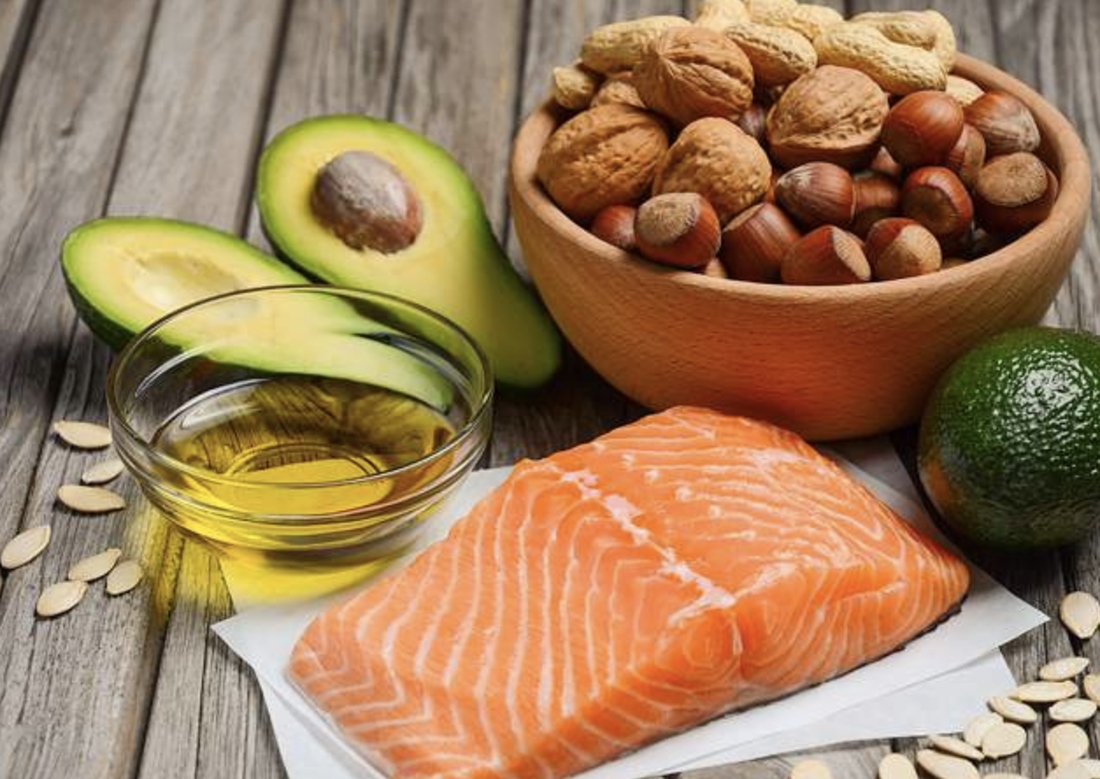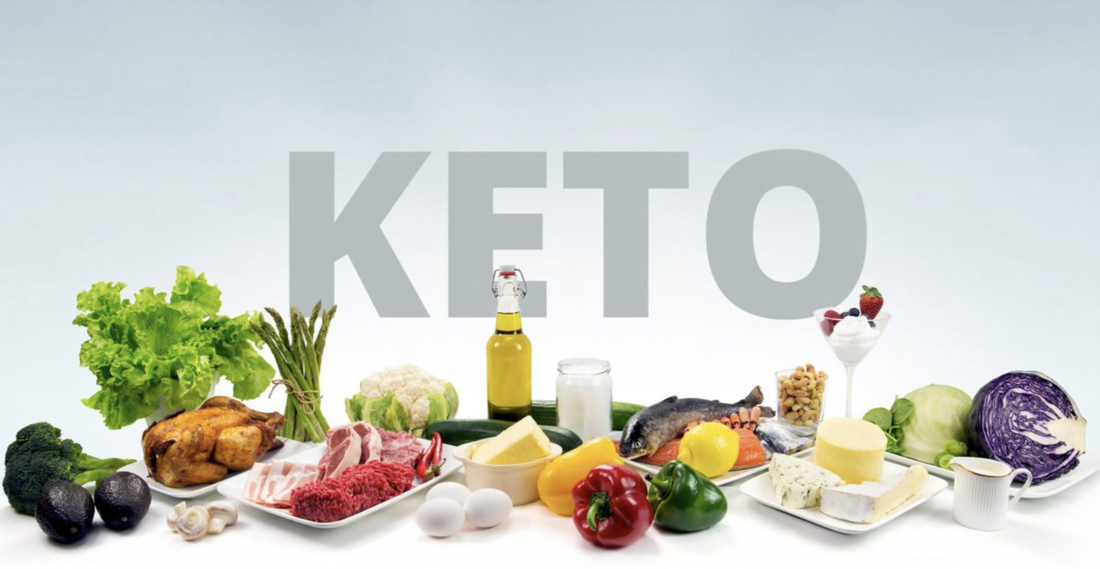Keto will help you improve your body composition in the short run. More importantly, Keto will improve your long-term health. Keto has been proven to reverse type 2 diabetes, heart disease, and obesity. Keto is also use to treat Alzheimer’s, dementia, Parkinson’s, and epilepsy.
You can track your progress getting into and maintaining nutritional ketosis with our free algorithm, Keto Score at https://www.ketonescore.com/
Putting a well formulated keto diet into practice is not difficult. Choose a lot of high fat, moderate protein foods, and eat very little carbs. Below is a general list of foods you should and should not eat.
Keto Friendly Foods
- Whole eggs
- Preferably pasture raised organic. There’s a big difference in the amount and quality of the omega fatty acids. Industrialized eggs are inferior.
- Butter
- Look for grass fed organic. Like eggs and other dairy, the quality and amount of nutrients depends largely on how the animal lived.
- Whole Fat Dairy
- Read the label and buy nothing with added sugar. Also, never buy fat-free or low fat. Saturated fat is the good fat.
- Whole fat dairy contains lactose (a form of sugar) so should be eaten in limited quantities.
- Whole fat dairy includes whole fat milk, Greek yogurt, cottage cheese, cheese, and sour cream.
- Avocado
- About 75% of the calories in an avocado comes from fat. The only fruit that provides substantial amounts of monounsaturated fats.
- Rich in vitamins C, E, K, and B-6 as well as riboflavin, niacin, folate, magnesium, and potassium.
- Avocados are also a rich source of omega-3 fatty acids.
- Coconut Oil
- The saturated fats in coconut oil increases your HDL/LDL ratio
- Rich in medium chain triglycerides (MCT) that can increase 24-hr energy expenditure by as much as 5%
- The digestion of MCTs by the liver creates ketones
- The MCTs in coconut oil curb appetite
- Olive Oil
- Rich is both monounsaturated and saturated fats
- Contains anti-inflammatory oleocanthal
- Cold Water Fish
- Rich in omega-3 fatty acids and high concentrations of DHA, the omega-3 that provides the greatest benefits to our brains.
- Includes salmon, anchovies, mackerel, sardines, and trout.
- Preferably antibiotic free, wild caught, as opposed to farm raised for better nutrient density.
- Shellfish
- High in omega-3 fatty acids
- Loaded with mineral including zinc, copper, iron, magnesium, and potassium
- Poultry
- Dark meat chicken and turkey are preferred over white meat for their higher percentage of essential fatty acids, omega-3 and omega-6
- Red Meat
- Rich in omega-3 fatty acids, the fatty acid CLA, vitamins B3, B6, B12, A, and E along with iron, zinc, selenium, creatine, and carnosine.
- Look for grass fed organic beef, lamb, and pork raised without drugs and hormones
- Avoid mass market or factory raised red meat. It’s grain fed, treated with nitrates, preservatives, and other chemicals.
- Avoid mass market red meat, typically raised with growth hormones and injected with anti-biotics in the feed lot.
- Anti-biotics and growth hormones in the meat pass through to the consumer
- Vegetables grown above ground
- Especially green leafy veggies including kale, chard, and spinach
- Veggies including asparagus, bok choy, broccoli, cauliflower, cabbage, zucchini
- Nuts and Seeds
- Rich is both monounsaturated and saturated fats
- High in fiber, protein and minerals
- Berries
- The fruit with the lowest glycemic index
- Loaded with micronutrients like vitamin C, folate, and potassium
- Sugar
- Raw sugar, cane sugar, honey, agave nectar, maple syrup, high-fructose corn syrup
The Truth About Net Carbs
All sugar enters your bloodstream quickly and elevate your blood glucose (blood sugar). Other than a few indigestible fibers, all dietary carbohydrates are eventually broken down into blood sugar. Whole grains and other low glycemic complex carbs are converted to blood sugar. With very few exceptions, all the carbohydrates you eat eventually become sugar. Clever marketers of processed foods recently invented the concept of net carbs. What are net carbs?
Net carbs is a processed foods marketing gimmick. They’ve jumped on growing public awareness of the health benefits of low carb diets. Processed food manufacturers would like for you to believe net carbs. Don’t. They subtract the fiber and sugar alcohols from the total carbs and then call the remainder net carbs. It’s true that some indigestible fibers pass through us and some sugar alcohols have little effect on blood sugar. But in in fact, those quantities are barely measurable. It’s true that different carbs have different glycemic indexes. For example, table sugar has a high glycemic index while whole grain oats have a low glycemic index. The glycemic index is simply the rate at which carbohydrates are broken down into blood sugar. All carbohydrates are broken down into blood glucose. Don’t believe the net carbs marketing gimmick. All carbs elevate your blood glucose.
- Starch
- Pasta, bread, rice, grains, French fries, potato chips, porridge, muesli
- Grains such as wheat, barley, oats, rice, rye, and millet
- Brown rice and quinoa
- Root Vegetables
- Potatoes, sweet potatoes, carrots, yams, beets
- Starchy Vegetables
- Corn, peas, parsnips, beans, legumes
- Fruit
- Oranges, apples, pears, bananas, pineapple, grapes, mangos
- If you must; blueberries, blackberries, raspberries, and strawberries
- Eat in very small quantities
- Best of only source of carbs for the day
- Alcohol
- Beer, wine, and spirits
- Your body treats alcohol as a toxin
- Your body stops burning fat for fuel as it processes alcohol
- Beer, wine, and spirits
Yours in Health and Fitness,
JD Griffin, Keto Score Founder


 RSS Feed
RSS Feed